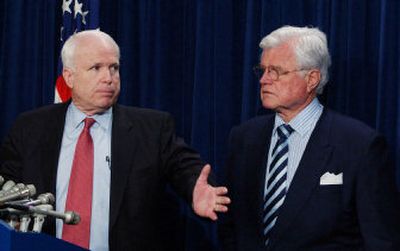Bush close to guest visa plan for most illegal immigrants

PHOENIX – Struggling to pacify his party’s warring wings, President Bush is moving toward allowing illegal immigrants who came to the U.S. before February 2004 to qualify for guest-worker visas. People smuggled in after then would be deported.
State leaders in Arizona and New Mexico have stepped up pressure on the Bush administration and the Republican-led Congress to better police U.S. borders and deal with an estimated 10 million people who are living illegally in this country.
“They’re trying to split the baby,” Sen. John McCain, R-Ariz., said of the White House plan, “and I don’t think they can do that.”
Bush and his advisers are caught between their supporters in the business sector, who believe the economy needs those workers, and conservatives whose priority is to clamp down on illegal immigration. The White House hopes to have a detailed proposal to Congress in late September or early October.
McCain, who ran against Bush for the 2000 GOP nomination and may seek the White House in 2008, is sponsoring a bill with Sen. Edward M. Kennedy, D-Mass., that would create 400,000 three-year visas for guest workers. The legislation has the flexibility to add more in the future and would let undocumented workers stay in the U.S. while they apply.
A competing plan by Sen. Jon Kyl, R-Ariz., would create two-year visas and require that guest workers and illegal immigrants leave the U.S. before they can apply for the chance to work legally in the country.
Conservative House Republicans tend to favor Kyl’s tougher approach. McCain mocks it.
“Turn yourself in so we can send you back to Mexico,” said McCain, throwing his head back in laughter during an interview at his Arizona office last week. “It’s not going to happen.”
The White House seems to agree with McCain.
According to administration and congressional officials who took part in a series of White House meetings this summer, Bush does not favor requiring illegal immigrants to be sent home to apply for the visas.
In a nod to his conservative base, however, the president has rejected a part of the McCain-Kennedy bill that the White House believes would put illegal immigrants on an automatic track to citizenship, the officials said.
The officials said it was unclear how many illegal immigrants came after February 2004 or how many later had children in the U.S., conferring U.S. citizenship on those babies. The White House wants to avoid a surge of illegal immigrants who would try to beat a prospective deadline, they said.
All sides agree that illegal immigration has become a national security, humanitarian and economic crisis:
•Intelligence agencies fear terrorists could slip into the U.S. through Mexico.
•Hundreds of illegal immigrants die each year while trying to enter the U.S. Those who make it often fall prey to criminals and opportunists.
•From construction companies in Arizona to farmers in the Midwest and California, many industries need those cheap and available workers.
“Just stop at one of these construction sites and look and see who those workers are. They’re all Hispanic,” McCain said. “And I bet you they’re illegal.”
Depending on how Hispanics react, this fall’s immigration debate could help determine whether Democrats or Republicans dominate the fastest-growing voting bloc in years to come.
The issue threatens to divide Democrats. Affluent, well-educated liberals are embracing immigration as part of cultural diversity. But poor Democrats, including blacks, are wary of Hispanics’ growing economic and political clout.
Democratic Gov. Janet Napolitano of Arizona, who supports the McCain-Kennedy bill, joined Gov. Bill Richardson, D-N.M., this month in declaring immigration emergencies in their states. “We just kept waiting and waiting and waiting but never did see a sense of urgency from Washington,” she said.
Voters are frustrated, too, especially in the Southwest, where illegal immigration is an unsettling fact of life.
“It’s sad to see Democrats doing what Republicans ought to be doing,” Danielle Taylor, 24, a Republican voter in Scottsdale, said during a break from her bank job. “Napolitano may have just earned my vote.”
McCain faced tough questions at a town hall meeting Thursday night in Mesa, where conservatives accused him of going soft on illegal immigrants. “No amnesty!” some shouted.
McCain says his bill does not provide amnesty. Conservatives say no better word describes allowing illegal immigrants to remain in the U.S.
Bush may face similar criticism. McCain, Napolitano and other supporters of guest workers argue that it is unrealistic to deport 11 million people.
McCain’s bill would require the undocumented workers to register with the government, pay all back taxes and a $2,000 fine, then go through a series of background checks and work at least six years before applying for a green card.